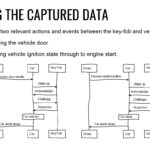Are you concerned about the performance of your vehicle and suspect catalytic converter issues? The signs of failing catalytic converters can be subtle but understanding them is crucial for maintaining optimal vehicle health. At DTS-MONACO.EDU.VN, we’re dedicated to providing comprehensive automotive diagnostic and repair knowledge, including how to identify catalytic converter problems. Recognizing early warning signs and addressing them promptly can prevent costly repairs and ensure your vehicle operates efficiently while complying with emissions standards. Keep an eye out for these symptoms of a failing catalytic converter: reduced engine performance, unusual smells, and decreased fuel economy.
Contents
- 1. Why Are Catalytic Converters Important for Vehicle Emission?
- Why is Replacing a Failing Catalytic Converter Important?
- 2. How Does The Check Engine Light Indicate Catalytic Converter Issues?
- 3. What Does Sluggish Acceleration Imply About The Catalytic Converter’s Condition?
- 4. How Does a Catalytic Converter Impact Fuel Efficiency?
- 5. How Can Unusual Smells Indicate Catalytic Converter Issues?
- 6. What is the Relationship Between Engine Misfires and Catalytic Converters?
- 7. What Do Rattling Noises Suggest About a Catalytic Converter’s Condition?
- 8. How is Car Coding Used in Conjunction With Catalytic Converters?
- 9. What is Involved in Replacing a Failing Catalytic Converter?
- 10. What Aftermarket Options Improve Exhaust Systems?
- FAQ: Signs of Failing Catalytic Converters
- 1. How do I know if my catalytic converter is failing?
- 2. Can a bad catalytic converter cause other problems?
- 3. Is it safe to drive with a failing catalytic converter?
- 4. How much does it cost to replace a catalytic converter?
- 5. Can I clean my catalytic converter instead of replacing it?
- 6. What causes catalytic converters to fail?
- 7. Will a failing catalytic converter affect my emissions test?
- 8. How can I prevent catalytic converter failure?
- 9. Can car coding help with catalytic converter performance?
- 10. Where can I get professional help with diagnosing catalytic converter issues?
1. Why Are Catalytic Converters Important for Vehicle Emission?
Catalytic converters play a vital role in minimizing air pollution from vehicles. Functioning as the final defense against harmful emissions, they are standard components in vehicles for nearly four decades. Catalytic converters contain a honeycomb structure made of precious metals like palladium, rhodium, and platinum. These metals act as catalysts to filter out contaminants from your vehicle’s exhaust. If your car runs on gasoline or diesel, its exhaust system typically releases gases such as carbon monoxide, sulfur dioxide, lead, nitrogen dioxide, and ground-level ozone.
In the 1970s, there was a growing awareness of the detrimental effects of these gases on the environment, leading vehicle manufacturers to develop catalytic converters. These devices break down unburned gases during combustion. According to the U.S. Environmental Protection Agency (EPA), catalytic converters operate at temperatures up to 800 degrees Fahrenheit. This process transforms toxic gases into safer elements, like carbon dioxide, oxygen, and water, benefiting both humans and the environment.
 Catalytic converter honeycomb
Catalytic converter honeycomb
Why is Replacing a Failing Catalytic Converter Important?
Replacing a failing catalytic converter is essential for reducing air pollution. Most vehicle owners recognize this as a compelling reason to address catalytic converter issues. Early detection of symptoms of a clogged catalytic converter is crucial for several practical reasons. According to JIT Truck Parts, 34 out of 50 states require emissions testing, and a failing catalytic converter will cause your vehicle to fail these tests. Additionally, prolonged driving with a bad catalytic converter can lead to overheating, potentially causing the engine to shut down permanently. Therefore, it’s important to monitor and address these signs of catalytic converter failure.
2. How Does The Check Engine Light Indicate Catalytic Converter Issues?
Modern vehicles feature a check engine light that activates when sensors detect a problem, including issues with the catalytic converter. Newer engines have oxygen and air/fuel sensors that monitor the catalytic converter’s performance relative to specified tolerance levels. By assessing exhaust gas levels, the car’s internal computer can identify when a failing catalytic converter is present and trigger the check engine light. This is a straightforward method for troubleshooting catalytic converter problems. However, the sensors may not always immediately detect the issue.
According to a study by the National Institute for Automotive Service Excellence (ASE), interpreting check engine light codes requires specialized diagnostic tools and knowledge. For automotive technicians looking to enhance their diagnostic skills, DTS-MONACO.EDU.VN offers comprehensive training programs and advanced software solutions like DTS-Monaco. These resources can significantly improve the accuracy and efficiency of diagnosing catalytic converter and other engine-related issues. Contact us at Address: 275 N Harrison St, Chandler, AZ 85225, United States. Whatsapp: +1 (641) 206-8880. Website: DTS-MONACO.EDU.VN.
 Car dashboard with check engine light illuminated
Car dashboard with check engine light illuminated
3. What Does Sluggish Acceleration Imply About The Catalytic Converter’s Condition?
A noticeable and significant loss of engine power, accompanied by a reduced ability to accelerate, may indicate a common symptom of a clogged catalytic converter. The engine’s intake of clean air and expulsion of exhaust gases are interconnected. A blockage in the exhaust system disrupts this process. A clogged converter prevents the engine from efficiently mixing air and fuel. This results in less powerful combustion, decreased power, and poor acceleration.
According to a report by the Department of Energy, a properly functioning catalytic converter is essential for maintaining optimal engine performance. When the catalytic converter is restricted, it increases backpressure in the exhaust system, which can lead to a noticeable decrease in acceleration. To properly diagnose and resolve these issues, automotive technicians often rely on advanced diagnostic tools and software. DTS-MONACO.EDU.VN offers specialized car coding and diagnostic solutions designed to help technicians accurately identify and address catalytic converter problems, restoring vehicle performance.
4. How Does a Catalytic Converter Impact Fuel Efficiency?
Experiencing more frequent trips to the gas station? A failing catalytic converter typically results in poor fuel efficiency. The engine depends on O2 sensors to ensure proper mixing of oxygen and fuel. A clog can mislead the sensor, causing it to overestimate the amount of air entering the engine. In response, the system injects more fuel than necessary, leading to a condition known as “running rich.” This issue can exacerbate buildup in a failing catalytic converter if it is already clogged.
According to the Environmental Protection Agency (EPA), catalytic converter issues can significantly reduce fuel economy. Inefficient fuel combustion due to a faulty converter can waste fuel and increase emissions. Addressing these issues promptly is crucial for both environmental and economic reasons. Automotive professionals can benefit from advanced diagnostic tools like DTS-Monaco, offered by DTS-MONACO.EDU.VN. These tools provide the precision and insights needed to diagnose and resolve catalytic converter-related fuel efficiency problems, ultimately saving vehicle owners money and reducing emissions.
 Refueling car at gas station
Refueling car at gas station
5. How Can Unusual Smells Indicate Catalytic Converter Issues?
When a catalytic converter functions properly, it converts all chemicals and gases produced within the exhaust system into safe compounds. However, catalytic converter problems often lead to a noticeable smell of rotten eggs or sulfur from the exhaust. Driving with these unpleasant-smelling, harmful gases entering the cabin can cause health issues or lightheadedness. Both of these issues can be potentially fatal while driving. If catalytic converter problems reach this stage, immediate replacement of the component is essential.
According to the National Highway Traffic Safety Administration (NHTSA), unusual exhaust smells can be a critical indicator of vehicle malfunction and potential safety hazards. The presence of sulfur or rotten egg odors often signifies that the catalytic converter is not effectively converting hydrogen sulfide into sulfur dioxide. Technicians can leverage advanced diagnostic tools to accurately assess the catalytic converter’s efficiency and address the underlying issues promptly. DTS-MONACO.EDU.VN provides comprehensive training and software solutions, such as DTS-Monaco, to help technicians diagnose and resolve these issues effectively.
6. What is the Relationship Between Engine Misfires and Catalytic Converters?
The performance of the engine and the vehicle relies on complete fuel combustion. A failing catalytic converter results in incomplete combustion within the firing cylinders. This causes an engine misfire and makes it difficult to start the car. Frequent engine misfires are signs of a failing catalytic converter that requires replacement.
According to a study by the Society of Automotive Engineers (SAE), engine misfires can significantly impact vehicle performance and emissions. Incomplete combustion not only reduces power but also increases the levels of harmful pollutants released into the atmosphere. Automotive technicians can utilize advanced diagnostic software, like DTS-Monaco from DTS-MONACO.EDU.VN, to identify the root causes of engine misfires and accurately diagnose catalytic converter issues. Contact us at Address: 275 N Harrison St, Chandler, AZ 85225, United States. Whatsapp: +1 (641) 206-8880. Website: DTS-MONACO.EDU.VN.
7. What Do Rattling Noises Suggest About a Catalytic Converter’s Condition?
Symptoms of a failing catalytic converter often manifest as unusual sounds, particularly when using a rich fuel mixture. A failing catalytic converter often produces a rattling noise coming from under the vehicle and engine when starting, idling, or driving.
Excessive heat or damage within the converter can cause the honeycomb materials to break apart, leading to the rattling noise. Ignoring these abnormal rattles can lead to further damage over time. According to research from the California Air Resources Board (CARB), physical damage to the catalytic converter’s internal components can significantly impair its ability to reduce emissions. Automotive technicians should promptly address these issues to prevent further damage. DTS-MONACO.EDU.VN offers specialized training and diagnostic tools to help technicians accurately assess and resolve catalytic converter problems.
8. How is Car Coding Used in Conjunction With Catalytic Converters?
Car coding plays a crucial role in optimizing the performance and diagnostics of catalytic converters. Modern vehicles are equipped with sophisticated engine control units (ECUs) that monitor the performance of the catalytic converter through various sensors, such as oxygen sensors and temperature sensors. Car coding involves reprogramming these ECUs to fine-tune the parameters that govern engine operation and emissions control. For example, technicians can use car coding to adjust the fuel-air mixture, ignition timing, and other settings to ensure that the catalytic converter operates at its optimal efficiency.
Moreover, car coding can be used to diagnose issues with the catalytic converter more accurately. By accessing the ECU’s diagnostic data, technicians can identify specific fault codes and sensor readings that indicate a problem. This information can help pinpoint the exact cause of the issue, whether it’s a clogged converter, a faulty sensor, or another related problem. DTS-MONACO.EDU.VN offers advanced car coding training and software solutions, such as DTS-Monaco, to empower automotive technicians with the skills and tools needed to effectively diagnose and optimize catalytic converter performance.
9. What is Involved in Replacing a Failing Catalytic Converter?
Once the symptoms of a failing catalytic converter are recognized, replacement is the next step. The replacement process is typically straightforward, often taking only about an hour. When replacing a failing catalytic converter, consider upgrading the entire exhaust system. Installing an aftermarket cat-back exhaust along with high-flow cats can improve emissions quality and increase the engine’s power output.
According to experts at Corsa Performance, upgrading the exhaust system can significantly enhance engine performance and efficiency. A high-quality exhaust system allows the engine to breathe more freely, reducing backpressure and improving overall combustion. Additionally, consider installing aftermarket headers to further optimize the exhaust system’s performance. Contact us at Address: 275 N Harrison St, Chandler, AZ 85225, United States. Whatsapp: +1 (641) 206-8880. Website: DTS-MONACO.EDU.VN.
10. What Aftermarket Options Improve Exhaust Systems?
After replacing a failing catalytic converter, consider upgrading the exhaust system to maximize the engine’s potential. CORSA Performance has been a leading manufacturer of high-end aftermarket exhausts for over 25 years. Their patented RSC® (Reflective Sound Cancellation®) technology ensures vehicles stay in top shape longer, drive better, and sound great.
According to CORSA Performance, upgrading to a high-quality exhaust system offers numerous benefits, including improved engine performance, enhanced sound, and increased durability. With expert craftsmanship and innovative technology, CORSA Performance exhaust systems are designed to deliver an exceptional driving experience. If you have any questions about their products, their team of experts is available to help.
FAQ: Signs of Failing Catalytic Converters
1. How do I know if my catalytic converter is failing?
Several symptoms indicate a failing catalytic converter, including a check engine light, sluggish acceleration, reduced fuel economy, unusual smells (like rotten eggs), engine misfires, and rattling noises from the engine.
2. Can a bad catalytic converter cause other problems?
Yes, a failing catalytic converter can lead to reduced engine performance, increased emissions, overheating, and potential damage to other exhaust system components.
3. Is it safe to drive with a failing catalytic converter?
Driving with a failing catalytic converter is not recommended, as it can cause further damage to your vehicle and increase harmful emissions. It’s best to address the issue as soon as possible.
4. How much does it cost to replace a catalytic converter?
The cost of replacing a catalytic converter varies depending on the vehicle’s make and model, as well as the type of replacement converter used. On average, it can range from $800 to $2,000.
5. Can I clean my catalytic converter instead of replacing it?
While some catalytic converter cleaning products are available, they are often ineffective and may cause further damage. Replacement is usually the best option for a failing catalytic converter.
6. What causes catalytic converters to fail?
Catalytic converters can fail due to various factors, including contamination from oil or coolant leaks, overheating, physical damage, and normal wear and tear.
7. Will a failing catalytic converter affect my emissions test?
Yes, a failing catalytic converter will likely cause your vehicle to fail an emissions test, as it will not effectively reduce harmful pollutants.
8. How can I prevent catalytic converter failure?
Regular vehicle maintenance, including oil changes and addressing engine issues promptly, can help prevent catalytic converter failure.
9. Can car coding help with catalytic converter performance?
Yes, car coding can optimize engine parameters to ensure the catalytic converter operates at its optimal efficiency, improving performance and reducing emissions. DTS-MONACO.EDU.VN offers advanced car coding training and software solutions for this purpose.
10. Where can I get professional help with diagnosing catalytic converter issues?
DTS-MONACO.EDU.VN provides comprehensive training programs and advanced software solutions, such as DTS-Monaco, to help automotive technicians accurately diagnose and resolve catalytic converter issues. Contact us at Address: 275 N Harrison St, Chandler, AZ 85225, United States. Whatsapp: +1 (641) 206-8880. Website: DTS-MONACO.EDU.VN.
By understanding the signs of failing catalytic converters and taking prompt action, you can ensure your vehicle operates efficiently, reduces harmful emissions, and avoids costly repairs.
Are you an automotive technician aiming to elevate your diagnostic capabilities and master car coding techniques? Look no further than DTS-MONACO.EDU.VN. Our specialized training programs and cutting-edge software solutions, including DTS-Monaco, are designed to equip you with the skills needed to accurately diagnose and optimize catalytic converter performance. Whether you’re tackling engine misfires, fuel efficiency issues, or unusual exhaust smells, our comprehensive resources will empower you to deliver top-notch service and keep your customers’ vehicles running smoothly. Don’t miss out on the opportunity to enhance your expertise and stay ahead in the rapidly evolving automotive industry. Contact us today to learn more about our training programs and software solutions at Address: 275 N Harrison St, Chandler, AZ 85225, United States. Whatsapp: +1 (641) 206-8880. Website: DTS-MONACO.EDU.VN.

